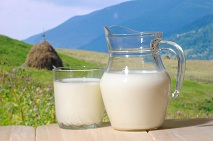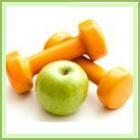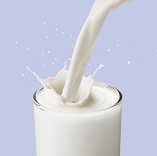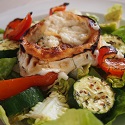Lose Weight
![]() Calories in Food
Calories in Food
![]() Calories in Dairy
Calories in Dairy
![]() Calories in Goat Milk
Calories in Goat Milk
Calories in Goat Milk, Nutrition Facts and Health Benefits
How many calories in Goat milk? See below, the Goat milk calories for the different serving sizes. We provide you with Goat milk nutrition facts and the health benefits of Goat milk to help you lose weight and eat a healthy diet.
Maybe surprisingly goat milk is drunk more widely across the world than cow's milk. It provides a good source of vitamins and minerals, as can be seen from the tables below.
Like cow's milk, it can be purchased in reduced fat or non fat varieties. If you're on a weight loss diet, we'd recommend the non fat variety so the fat content and calories in goat milk are lower.
We find goat milk slightly sweeter than cow's milk and it's definitely worth trying if you've never had goat milk before. A number of studies have found that the health benefits over cow's milk are greater including preventing both anaemia and bone softening, as goat milk contains more calcium.
Goat milk does contain less lactose than cow's milk, but it's thought not enough to permit everyone with lactose intolerance to drink it.

A number of countries suggest that both babies and infants do not drink goat milk.
Compare calories in Goat milk with the other calories in cheese and dairy products.
Milk, Goat, Fluid, With Added Vitamin D
Refuse: 0%| Serving Size | Calories per Serving |
| 100 grams | 288 kcal (69 kJ) |
| 1 cup, 244 grams | 168 kcal (703 kJ) |
| 1 fl oz, 30.5 grams | 21 kcal (88 kJ) |
| 1 quart, 976 grams | 673 kcal (2811 kJ) |
Goat Milk Nutritional Information
| Nutritional value per 100 g (3.5 oz) | |
|---|---|
| Proximates: | |
| Water | 87.03 g |
| Energy | 288 kJ (69 kcal) |
| Carbohydrates | 4.45 g |
| Sugars | 4.45 g |
| Protein | 3.56 g |
| Total Fat: | 4.14 g |
| saturated fat | 2.667 g |
| monounsaturated fat | 1.109 g |
| polyunsaturated fat | 0.149 g |
| Cholesterol | 11 mg |
| Minerals: | |
| Calcium, Ca | 134 mg (13 %) |
| Iron, Fe | 0.05 mg (0.3 %) |
| Magnesium, Mg | 14 mg (4 %) |
| Phosphorus, P | 111 mg (11 %) |
| Potassium, K | 204 mg (4 %) |
| Zinc, Zn | 0.30 mg (2 %) |
| Copper, Cu | 0.046 mg (2 %) |
| Manganese, Mn | 0.018 mg (0.9 %) |
| Selenium, Se | 1.4 mcg (2 %) |
| Vitamins: | |
| Thiamine (Vit. B1) | 0.048 mg (3.2 %) |
| Riboflavin (Vit. B2) | 0.138 mg (8 %) |
| Niacin (Vit. B3) | 0.277 mg (1.4 %) |
| Pantothenic acid (B5) | 0.310 mg (3.1 %) |
| Vitamin B6 | 0.046 mg (2 %) |
| Folate (Vit. B9) | 1 mcg (0.2 %) |
| Vitamin B12 | 0.07 mcg (1 %) |
| Vitamin A | 198 IU (4 %) |
| Vitamin E | 0.07 mg (0.4 %) |
| Vitamin D | 51 IU (13 %) |
| Vitamin K | 0.3 mcg (0.4 %) |
| Percentages are relative to US Recommended Daily Intake (RDI) for adults. | |
Author: Lana Soko
You Might Also Like:
Like This Page?
|
Share This Page:
|
Search Our Site:

Free E-Book:
We Recommend:
Looking to get your body into great shape? Get the very best results for your efforts and money! Save your valuable time from surfing the internet. These are theBestselling Weight Loss Programs

Programs that work and have thousands of satisfied customers worldwide!

 |




